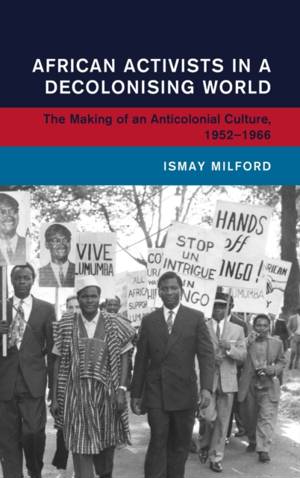
- Afhalen na 1 uur in een winkel met voorraad
- Gratis thuislevering in België vanaf € 30
- Ruim aanbod met 7 miljoen producten
- Afhalen na 1 uur in een winkel met voorraad
- Gratis thuislevering in België vanaf € 30
- Ruim aanbod met 7 miljoen producten
Zoeken
African Activists in a Decolonising World
The Making of an Anticolonial Culture, 1952–1966
Ismay Milford
€ 158,95
+ 317 punten
Omschrijving
As wars of liberation in Africa and Asia shook the post-war world, a cohort of activists from East and Central Africa, specifically the region encompassing present-day Malawi, Zambia, Uganda and mainland Tanzania, asked what role they could play in the global anticolonial landscape. Through the perspective of these activists, Ismay Milford presents a social and intellectual history of decolonisation and anticolonialism in the 1950s and 1960s. Drawing on multi-archival research, she brings together their trajectories for the first time, reconstructing the anticolonial culture that underpinned their journeys to Delhi, Cairo, London, Accra and beyond. Forming committees and publishing pamphlets, these activists worked with pan-African and Afro-Asian solidarity projects, Cold War student internationals, spiritual internationalists and diverse pressure groups. Milford argues that a focus on their everyday labour and knowledge production highlights certain limits of transnational and international activism, opening up a critical - albeit less heroic - perspective on the global history of anticolonial work and thought.
Specificaties
Betrokkenen
- Auteur(s):
- Uitgeverij:
Inhoud
- Aantal bladzijden:
- 320
- Taal:
- Engels
- Reeks:
Eigenschappen
- Productcode (EAN):
- 9781009276993
- Verschijningsdatum:
- 9/03/2023
- Uitvoering:
- Hardcover
- Formaat:
- Genaaid
- Afmetingen:
- 152 mm x 229 mm
- Gewicht:
- 635 g

Alleen bij Standaard Boekhandel
+ 317 punten op je klantenkaart van Standaard Boekhandel
Beoordelingen
We publiceren alleen reviews die voldoen aan de voorwaarden voor reviews. Bekijk onze voorwaarden voor reviews.











